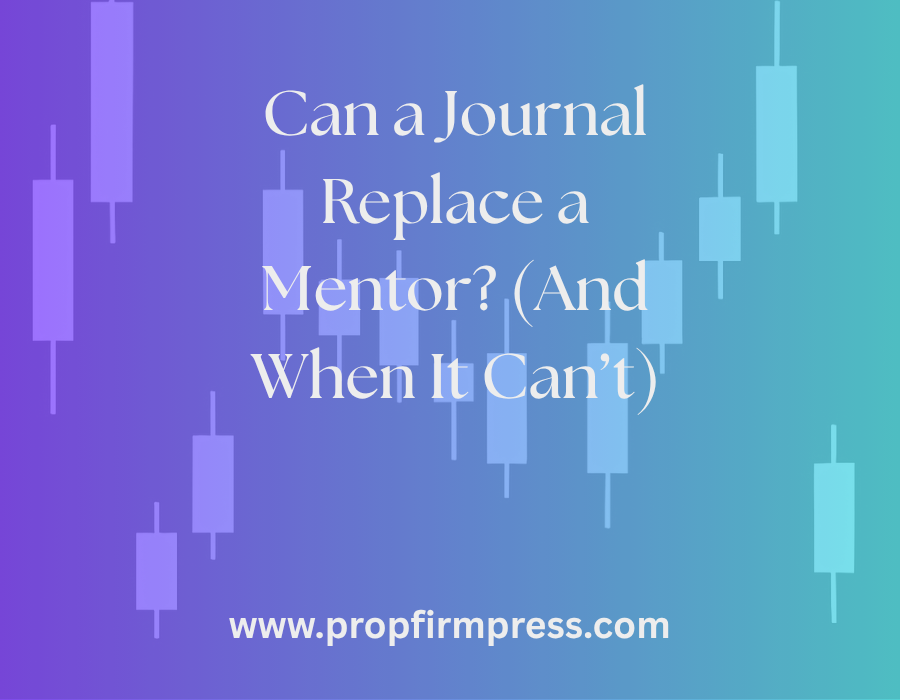Can a Journal Replace a Mentor? (And When It Can’t)
In trading, mentorship is often considered a fast track to success. But what if you don’t have access to a mentor? Can a trading journal step in and fulfill that role? In many ways, the answer is yes—especially for self-driven traders working through prop firm evaluations with companies like Bulenox or Prop Shop Traders. While a mentor offers perspective, a journal offers reflection—and that can be just as powerful.
What a Mentor Typically Provides
Before comparing, let’s define what a mentor does in the trading world:
- Reviews your trades with an experienced eye
- Helps you identify recurring mistakes
- Suggests strategy adjustments
- Offers emotional and mindset support
- Holds you accountable to your goals
These are valuable—but also replicable to some extent with structured journaling.
How a Journal Can Replicate Mentorship
A journal can mimic a mentor’s role in several key ways:
- Trade Reviews: A well-structured journal forces you to evaluate entries, exits, and rationale.
- Mistake Identification: Pattern tracking across trades highlights repeated errors.
- Mindset Monitoring: Emotional and confidence scoring builds self-awareness.
- Progress Tracking: A journal shows statistical improvement—or lack thereof.
- Consistency Prompts: Daily and weekly reviews act as self-coaching sessions.
When used with discipline, your journal becomes a self-teaching loop.
What a Journal Can’t Replace
There are limitations. A journal lacks:
- Outside Perspective: You may not see blind spots without someone else reviewing your logs.
- Market Wisdom: A mentor can compress years of experience into actionable advice—your journal can’t shortcut that learning curve.
- Real-Time Feedback: Journals reflect after the fact. Mentors can intervene in the moment.
This is where communities and occasional consultations can help bridge the gap.
Using Journal Prompts as a Mentor Substitute
You can write prompts into your journal as if your mentor were asking:
- “Did you follow your risk plan today?”
- “Was this trade aligned with your strategy?”
- “What triggered your exit decision?”
- “Was emotion present in your execution?”
Answering these honestly builds the habit of reflective questioning—a critical part of growth.
Templates That Act Like Coaches
Prop Firm Press Journal Sheets are built with mentorship in mind. Each template guides you through trade reviews, emotional tracking, and setup grading. With weekly summaries, you’ll start to “coach yourself” through repetition and habit.
When to Seek an Actual Mentor
If your journal keeps reflecting the same unresolved issues (e.g., frequent rule violations, strategy drift, emotional instability), it may be time to seek help. Some prop firms like The Legends Trading or Top One Futures also offer coaching or funded trader support—use it.
Additionally, forums, Discord groups, and trading communities can function as “peer mentors.” Share your journal insights and ask for outside feedback periodically.
The Best Approach: Both
Think of mentorship and journaling as complementary. A journal builds your internal compass. A mentor helps course-correct from an external view. If you can only pick one, start with journaling—it’s free, always available, and builds the foundation for lifelong improvement.
How Funded Traders Use Journals for Accountability
Many funded traders use their journals like a report card. They’re not just logging for memory—they’re reviewing to stay within rules. Journals help:
- Catch when you’re drifting from strategy
- Ensure you’re not breaking trailing drawdowns
- Spot when you’re trading emotionally
This level of self-accountability is what keeps your funded account intact. And for traders at firms like Funded Trading Plus or Instant Funding, that accountability translates directly to payouts.
Final Insight
You don’t need a mentor to start journaling. But the more detailed and consistent your journal becomes, the more it mimics the value of one. Treat it like a conversation—with yourself. That’s how you begin trading like a pro, even if you’re still learning solo.
